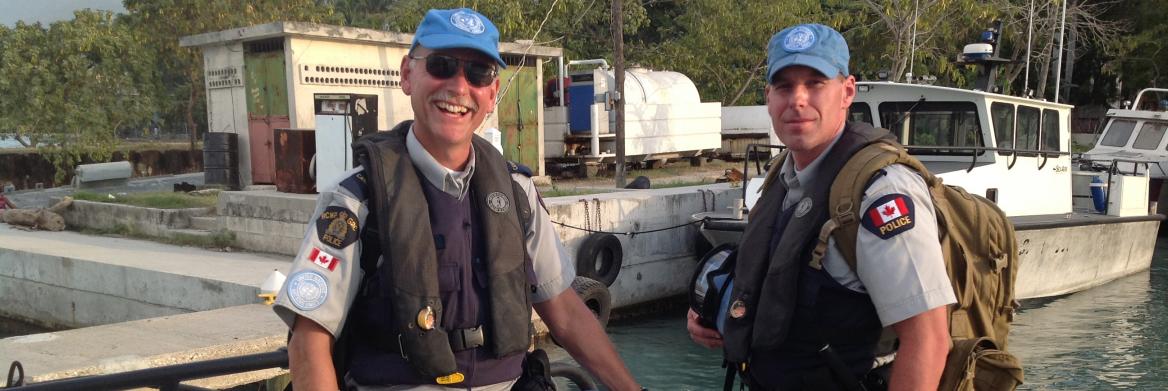When he first arrived for his United Nations Stabilization Mission in Haiti (MINUSTAH) in August 2012, RCMP member Cst. Carl-Eric Lippke was assigned a difficult task.
With extensive maritime experience – more than 500 days at sea – it wasn't the actual work of helping train the Haitian Coast Guard (GCH) that he found challenging. It was the fact that they had no funds to conduct sufficient training exercises for the GCH recruits.
Hands-on experience, Lippke explains, is crucial when learning how to operate a boat.
And with the two pillars of the mission – maritime development and operational capacity-building – working in silos, Lippke and his peers knew they had their work cut out for them.
Setting a standard
Working with Sgt. François Dubeau from the Sûreté du Québec (SQ) on the development side, the two set out to find a way to better integrate the different functions and roles within the mission as a whole.
They found that because there was very little communication between the teams, that there was a lack of consistency in what trainees were being taught. Contributing to this problem was that, every time new members were deployed, the training slate was wiped clean.
"When your mission ends, someone else comes and takes over," says Lippke. "We wanted to be sure there was a certain standard and that everyone could operate the same way so that when they have to respond to a call, they're going to get there and get the job done safely."
With the help of their colleagues from the various areas, they developed a standard training manual for the GCH. The two officers devoted countless hours to completing it. But once it was finished, they knew they still had to figure out how to get the recruits hands-on practice with boats.
A shot of genius
With no budget for fuel, Lippke and Dubeau knew they had to get creative.
"We had very few options," says Dubeau. "We thought about designing an automated navigation simulator, crazy as the idea seemed, but from the very start we knew it could cost thousands of dollars and that it would be impossible to get one in Haiti."
So after 200-plus hours of research, they decided to fund and build it themselves. Three other Canadian members pooled their money and they were able to purchase a simulator that struck the fine balance between affordable and realistic.
Building the simulator took four months from start to finish. They even went out and found the console from a decommissioned boat to make it as realistic as possible. At the end, when they presented it to the head of the GCH, his first words according to Dubeau were, "It's incredible."
"The best part is that it didn't cost them anything," says Lippke. "We took a chance buying it out of our own pockets, but we said, 'Why not? Let's just do it and, well, if it works, it's a shot of genius.' "
Continued co-operation
Once they had the simulator set up, they realized that even though it imitates changes in tide, weather and waves, it was still just an imitation. So they set out to find a way to bring the GCH trainees out on the water for hands-on training.
Lippke and Dubeau reached out to Leonardo Luz from the Uruguayan Navy and the chief of Maritime Operations of the military component in MINUSTAH. Luz was able to co-ordinate a new training standard that involves five weeks of training and mentoring recruits on everything from the rules of the sea to navigation.
"We work in our country with the coast guard, so it's very easy for us to help because the main tasks of the coast guards around the world are the same," says Luz.
Leaving in August 2013, Lippke was satisfied with the new system they'd left the GCH, and although he'd spent his year passing along his experience, he felt like he took away a lot as well.
"The beauty of it all is that it's not just that you're there to help the Haitians, you're also there to learn from the other police forces, see how they do things and how they interact to learn from them."
